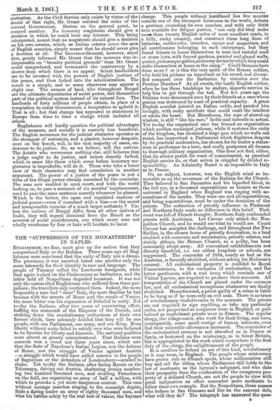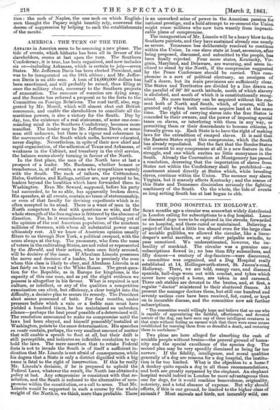THE "SUPPRESSION OF THE MONASTERIES" IN NAPLES.
ENGLISHMEN, we fear, must give up the notion that they comprehend Italy or the Italians. Three years ago all Eng- lishmen were convinced that the unity of Italy was a dream. The provinces, it was asserted, hated one another only the more intensely for their identity in race and language. The people of Tuscany called the Lombards foreigners, while they again looked on the Piedinontese as barbarians, and the latter held all Neapolitans degraded lazzaroni. It was not only the untravelled Englishman who suffered from these pre- judices; the travellers only confirmed them. Indeed, the more frequently a man had "done" Italy, the more familiar he had become with the streets of Rome and the canals of Venice, the more bitter was his expression of disbelief in unity. Yet to-day the Italians, after two years of unswerving effort, baffling the statecraft of the Emperor of the French, and striking down the revolutionary enthusiasm of their own former chiefs, have solemnly decided that they will be one people, with one Parliament, one army, and one King. Even liberty without unity failed to satisfy men who were believed to be fanatics for liberty and disunion. The national qualities were almost as grossly misunderstood. That Italians were cowards was a creed not three years since, which nei- ther the feats of Napoleon's Italian Legion, nor the defence of Rome, nor the struggle of' Venice against Austria —a struggle which would have added renown to the people of Saguntum or the defenders of Londonderry—availed to shake. Yet to-day the Italians, after facing Russia on the Tchernaya, driving out Austria, shattering armies number- ing two hundred thousand men, and rivalling Frenchmen on the field, are organizing an army of half a million with which to provoke a yet more dangerous contest. This race without courage marches singing to the conscript depots, finds a daring leader an army of eighty thousand men, and wins his battles solely by the real test of valour, the bayonet charge. This people without hardihood lies five months outside one of the strongest fortresses in the world, defeats a garrison exceeding its own number, and with only 5000 men available for fatigue parties, "not only did they make more than twenty English miles of most excellent roads, in a hilly, rocky country, and construct three long lines of batteries, earthworks, trenches, camps and magazines, and all contrivances belonging to such enterprises, but they found leisure to house themselves in neat and tasteful mud or stone huts, with fenced gardens, painted and glazed walls, quaint, picturesque gables, and every device by which they could make themselves at home in the camp." Could Romans have done more ? or is this the very spirit of the Roman soldier, who held his pickaxe as important as his sword, and diversi- fied conquest over the barbarian by victories over the Pontine Marshes ? At all events, the hardy English soldier, when he has these hardships to endure, imports navvies to help him to get through the toil. Not five years ago the Italians were denounced even by their friends as a race whose genius was destroyed by want of practical capacity. A great English novelist painted an Itahan noble, and painted him lovingly, with every attribute that could exalt the intellect or adorn the heart. But Riccabocca, the man of stored-up wisdom, is still "like his race," feeble and imbecile in action. Yet to-day the unpractical race has framed an organization which soothes municipal jealousy, while it restores the unity of the kingdom, has invented a siege gun which no walls can resist, has improvised a Parliament which frightens despots by its practical moderation, has chosen for its leader a states- man in preference to a hero, and coolly postpones all dreams to thorough military organization. One does not find, either, that its armies perish for want of commissariat, as practical English armies do, or that action is crippled by divided re- sponsibility. An Admiralty Board is as impossible in Italy as in France.
On no subject, however, was the English mind so im- movable as on the reverence of the Italians for the Church. They believed in San Januarius and his liquefied blood, in the evil eye, in a thousand superstitions as bizarre as those universal in England when England was ringing with ac- cusations of the monks. They were one and all superstitions, and being superstitious, must be under the dominion of the priests. The extinction of priestly influence in Piedmont and Northern Italy made no difference in this belief. Pied- mont was full of French thought ; Northern Italy confounded priests with Austrians. Let Cavonr only attack the Nea- politan Church, and he would see what he would see. Count Cavour has accepted the challenge, and throughout the Two Sicilies, in the chosen home of priestly domination, in a land studded with convents and monasteries, priestly estates, and stately abbeys, the Roman Church, as a polity, has been summarily swept away. All conventual establishments not directly beneficial, i.e. not either hospitals or schools, are suppressed. The concordat of 1834, nearly as bad as the Austrian, is formally abolished, without asking his Holiness's consent. All ecclesiastical property is confided to Royal Commissioners, to the exclusion of ecclesiastics, and the latter gentlemen, with a cool irony which reminds one of Visitor Layton, are required to produce their accounts. All temporalities of the Church are placed under the common law, and all ecclesiastical exemptions whatsoever are finally abolished. Henceforward, a priest guilty of a crime is liable to be hung as if he were only an evil man. There is no trace of revolutionary vindictiveness in the measure. The priests are not required to sign anything, or take any particular oaths, not pauperized as nonjurers were in England, or gull- lotined as recalcitrant priests were in France. The regular clergy, the village curds, who work for their living, and have, consequently, some small vestige of human interests, even find their miserable allowances increased. The remainder of the ecclesiastical revenue is not absorbed as in France or Spain, or bestowed on the aristocracy, as in Great Britain, but is appropriated to the work which everywhere is the first duty of the clergy, the enlightenment of the people. It is needless to defend an act of this kind, revolutionary as it may seem, in England. The people whose aristocracy have grown rich on Church spoils, whose millionnaires still buy and sell the tithes, whose Parliament still holds to the law of mortmain as the layman's safeguard, and who (late their prosperity from the confiscation of the overgrown pro- perty of a debased Church, are not the people to view with great indignation an effort somewhat more moderate to ollow their own example. But the Neapolitans, these masses who believe in San Genuaro and live on the convent dole, What will they do ? The telegraph has -answered the quee- n tion : the mob of Naples, the one mob on which English- men thought the Papacy might heartily rely, answered the decree of suppression by helping to sack the establishments of the monks.































 Previous page
Previous page